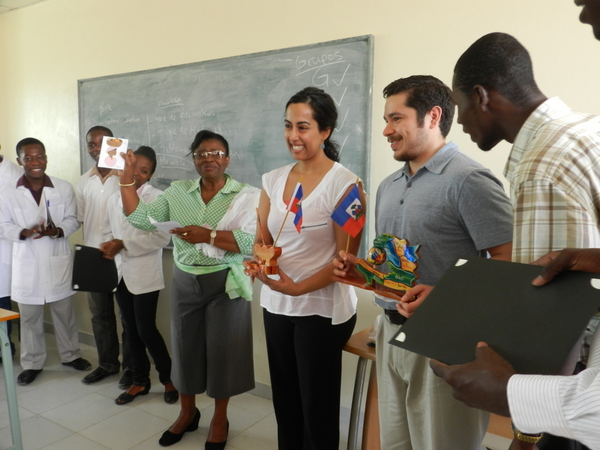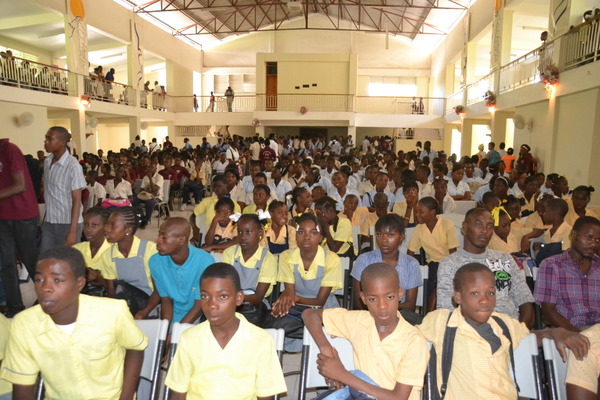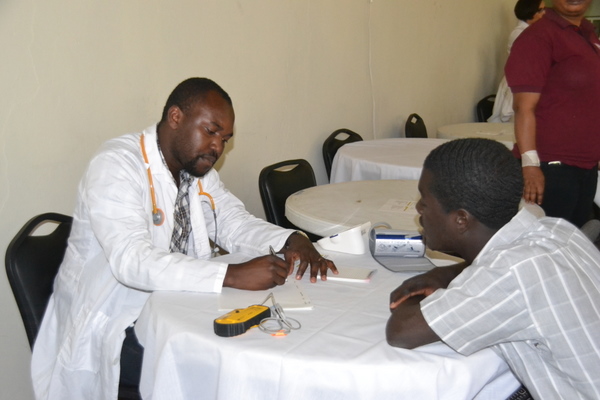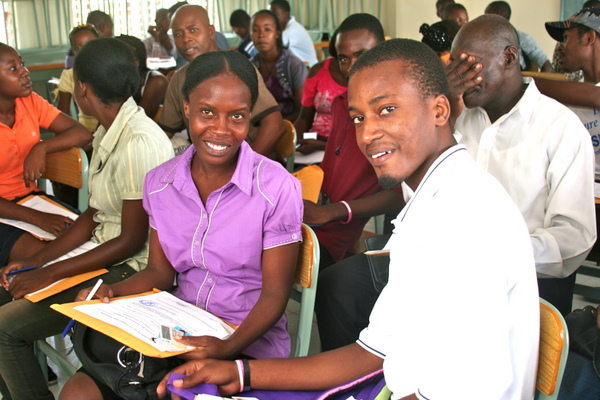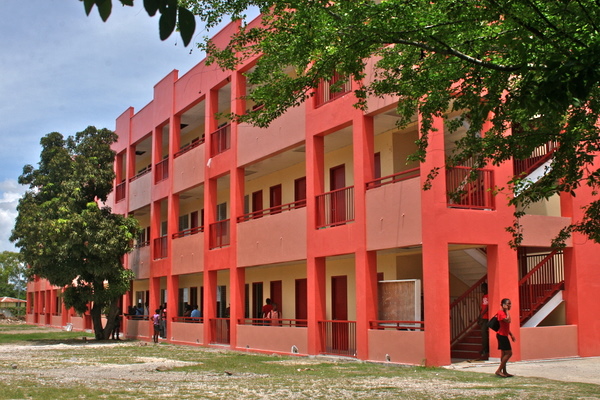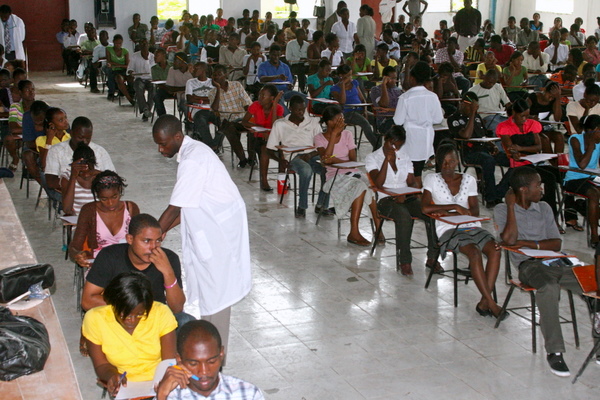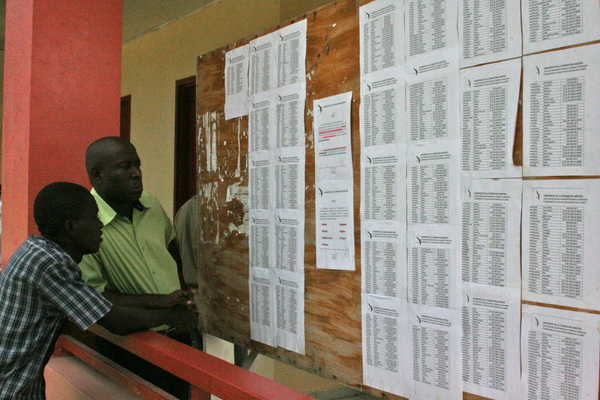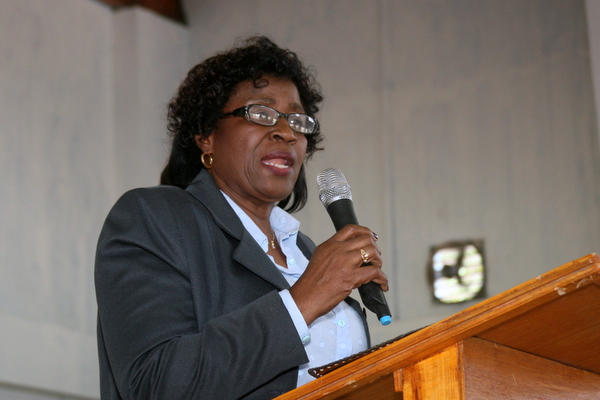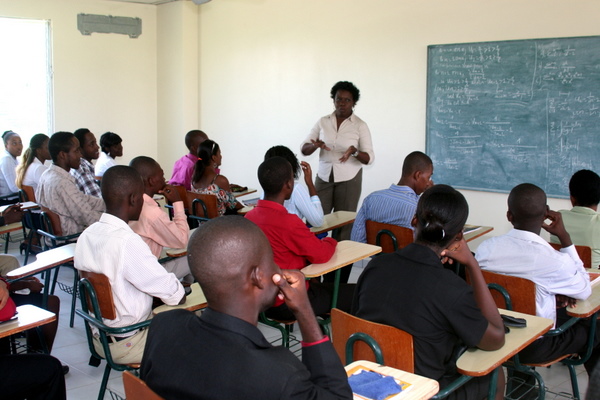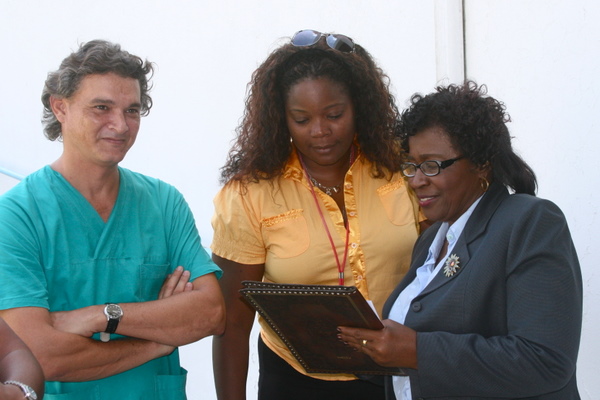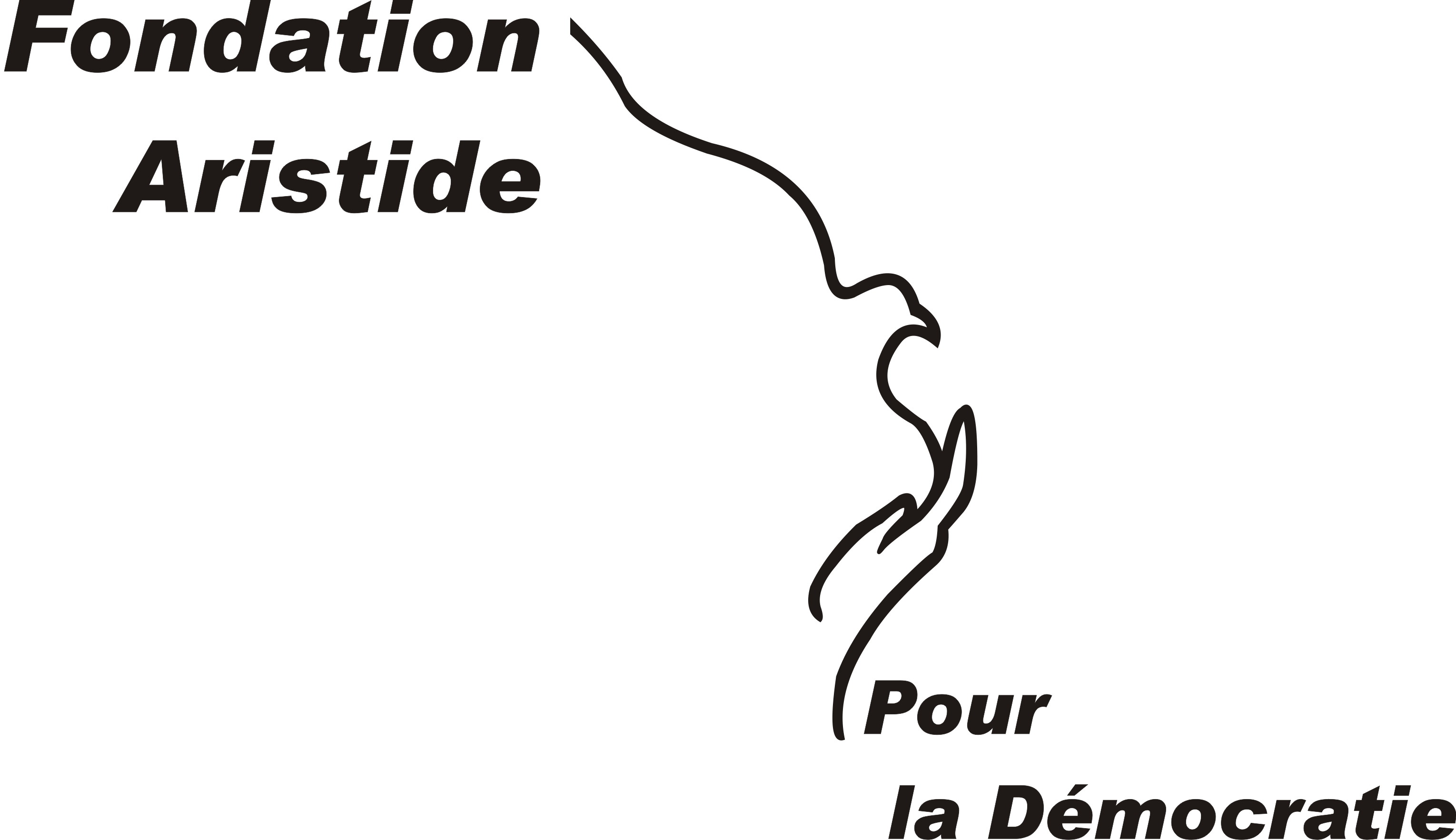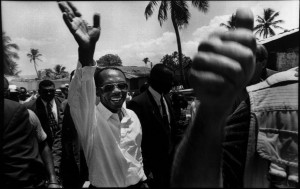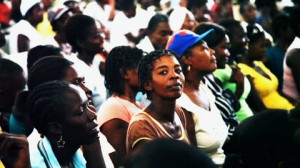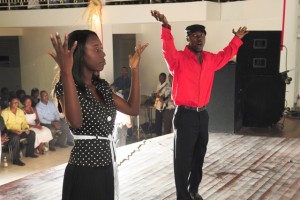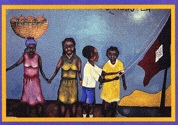UNIFA Medical School Enters its Second Semester
The second semester of Medical School at UNIFA began on January 9. After three months of intensive Spanish language training, core first year medical school courses began: anatomy, embriology, histology, medical ethics, physiology and bio-chemistry. Haitian doctors Francis St. Hubert, Pierre Gaetjeans and Lantz Etienne joined their Cuban counterparts on the UNIFA medical faculty. Newly purchased laboratory equipment – microscopes, prepared slides and anatomical models, also arrived mid-semester as teaching supplements for the first year curriculum. The 126 students, initially divided into 4 sections for were put into two, groups, Group A and B. Students continue their study of Spanish in the mornings, while the core Medical School courses are taught in the afternoon. An English course has been added, to provide proficiency at a time where English is increasingly gaining ground in Haiti; and a French writing class (two class hours a week) devoted to strengthening writing skills has also been added.
Students are in class from 7:30 to 5:00, five days a week. Newly installed internet access will broaden research capacities and the availability of online teaching material.
Visiting Professorships: Partnership with Physicians for Haiti
Since its founding in 2001, one of UNIFA’s goals was to open its doors to ideas and teachings beyond Haiti through hosting international lecturers. That is why 22 professors’ residences were constructed less than a 10 minute walk from the main classrooms and administration building, and in close proximity to the student dorms. In early December 2011, Dr. Aristide met with six members of Physicians for Haiti, a Boston-based health organization, to explore the possibility of a partnership that could begin to bring visiting professors and lecturers to UNIFA on a rotating basis. The founding members of the group understood that the long term solution to Haiti’s health crisis – worsened by the earthquake – lay in training more Haitian health care professionals. They committed to focusing their skills and energy on medical education in Haiti on the principles of “partnership, bidirectional education and health equity.” On January 19, 2012, a memorandum of understanding was signed to implement a partnership for medical education between UNIFA and Physicians for Haiti. One of the key terms of this agreement is a commitment by the organization to create a pool of visiting instructors who will teach medical students at UNIFA. During their stay, these visitors will be hosted by UNIFA. The teaching program will be monitored and evaluated by both institutions. In addition, the agreement signed provides that the two institutions will collaborate on research projects.
Dr. Lopa Basu, the first visiting instructor recruited by Physicians for Haiti arrived in March. She holds a masters degree in public health and is currently in the medical residency program at Johns Hopkins University. Prior to that, she was a research associate at the Johns Hopkins Center for Public Health & Human Rights. Dr. Basu taught the first half of a two week class (20 class hours) titled: Introduction to public health and social determinants of health. During the second week, she was joined by Dr. Ruben Frescas, who also holds a masters degree in public health and was a teaching assistant at Loyola University School of Medicine. The focus of Dr. Frescas’ lectures was the social determinants of health.
Professors’ residences
Dr. Lopa and Dr. Frescas spent their two weeks as visiting lecturers at UNIFA in one of the eight newly renovated professors’ residences on campus. The 22 residences are individual bungalows with a kitchen, living space and 2 to 3 bedrooms. The residences, like the dorms, were once occupied by victims of the January 20, 2010 earthquake seeking shelter. From July to September UNIFA worked with the families in the professors’ residence, the local magistrate’s office and various international groups to help these individuals relocate. Renovations started in December 2011. Cuban instructors and an attendant reside in five of the other buildings.
Cafeteria service
The long days on campus (7:30-5:00) necessitated offering students, faculty and staff food services at an affordable price. Space was identified for a cafeteria and estimates received on the cost of equipment and construction. However, UNIFA was not financially prepared for this expense. Evelyn Perrard, UNIFA secretary general and former director of the country’s national school lunch program could not wait. With a small staff of two cooks, 2 assistants, four servers and someone at the cash register. Mme Perrard set up a breakfast and lunch program capable of serving the entire UNIFA community. Balanced meals that include a fresh fruit, a vegetable and as much local produce as possible, are prepared in one facility and carried to the auditorium where chairs and tables are set up to temporarily serve as a cafeteria. Breakfast costs 20 gourdes (about .50 USD), lunch 60 gourdes (1.42 USD); or both meals for a discounted 75 gourdes (1.78 USD).
By June the Medical School at UNIFA will have completed its first full academic year in since the coup of 2004 and the earthquake of 2010. It has taken tremendous hard work and persistence on behalf of all the students, staff and faculty to begin once more under very difficult circumstance and with limited resources. We would like once more to thank Partners in Health and the Haiti Emergency Relief Fund for their financial support. Students fees fund a portion of UNIFA’s budget, but we count on supporters internationally to fill in the rest. If you would like to support UNIFA you can make a tax deductible donation via the Partnership for Education, Democracy and Health in Haiti. Donations can be sent to: Partnership for Education, Democracy and Health in Haiti, PO Box 490271, Key Biscayne, Florida 33149.
Healthcare and Healh Education at the Aristide Foundation
March 8, 2012 was the 16th anniversary of the Aristide Foundation for Democracy. To mark the anniversary and International Women’s Day, the Foundation organized a health fair. Dr. Jessy Pierre, the medical director for the day, coordinated 32 doctors and 15 nurses who consulted over 600 people during the six hour clinic. The medical staff included two optometrists and a dentist. Students from 29 area schools came to the Foundation for the day for one-on-one consultations with physicians and also to hear health education talks. This health fair was organized in conjunction with 29 schools in the La Plaine area– whose students don’t often get the opportunity to consult with physicians.
While students waited for their consultations, the doctors present offered medical educations talks. Dr. Marie Antoinette Gauthier (surgeon and former member of Haiti’s national football team) stressed with students the importance of physical activity and encouraged them to find creative ways to stay active – all the while conscious that many schools don’t have any outdoor space, the few public parks that exist in Port-au-Prince are still occupied and walking on the streets dangerous with cars and taxi-motorcycles (taxi-moto). As students waited, doctors and/or nurses spoke to small groups about general hygiene, and with the rains approaching, the risks of cholera and cholera prevention
March also saw the inauguration of ‘Klinik Alo Dokté’ (Hello, Doctor Clinic)
Alo Dokte (Hello Doctor) is a public health education program on the Foundation’s radio station, Radyo Timoun. The program, which was launched in January, is hosted by 5 doctors and one dentist, who take calls from the public on health topics. All of these doctors are part of the corps of 745 Haitian physicians who were trained in Cuba since 1996.
The radio programs runs for one hour, 5 days a week. the program begins with a discussion of a health related topic (AIDS prevention, How to recognize Cholera, etc.) Phone lines are then open to callers. Adults and children then call in with very specific and sometimes very serious questions about their own health or the health of a family member. The doctors offer advice and answers to questions. The doctors also give out their personal cell phone numbers and get calls well into the night, even after they’ve left the radio station.
The tremendous response to the show has led to a decision to to create a clinic in the Foundation linked to the show where instead of calling, members of the community can come in person for a consultation with any one of the participating doctors.
UNIFA MEDICAL SCHOOL REOPENS
On September 26, 2011 the Medical School of UNIFA (the University of the Aristide Foundation) officially reopened its doors to a new class of future Haitian doctors. Seven years after the school’s forced closure in 2004, and four months after the return of former President Jean-Bertrand Aristide to Haiti, medical education resumed at UNIFA.
Over the summer of 2011, the Faculty of Medicine (pictured below) was repaired and refurbished after sustaining mild damage in the 2010 quake.
In late August, recruitment of students began. A week-long registration period brought thousands of young applicants to UNIFA and the Aristide Foundation where initial registration was held. Nine hundred students whose grades and scores on the Baccalaureate exam met the minimum requirement went on to take an entrance exam.
From the 900 applicants, 126 students who received the highest test scores were selected.
UNIFA was founded in 2001 in response to the desperate need for more doctors and health professionals in Haiti. A fundamental part of its mission was and is to begin to break down long traditions of exclusion of the poor majority in Haiti from access to higher education. Even before the earthquake there were very few spots in medical schools in Haiti (private or public). Gaining entrance to Medical School was nearly impossible for students without connections or financial means. The earthquake destroyed or severely damaged 80% of the institutions of higher education, most are still struggling to resume full functioning. All of this made the reopening of UNIFA a priority. Today UNIFA still aims to combat social exclusion by recruiting students from families who have historically been unable to access higher education, from all ten departments of Haiti, and with a commitment to equal gender representation. Without financial support from the public sector, UNIFA can no longer offer Medical education free of charge. However tuition at UNIFA is just one-third of what private medical school in Haiti charge.
On September 26, 2011 Dr Ginette Lubin the new Dean of the Medical School welcomed the new students to the campus.
Classes began the next day. This fall the students completed a 3-month intensive Spanish language program. As was the case before 2004, UNIFA’s medical curriculum is based on the curriculum used in Cuba, which has trained thousands of doctors from Latin America. UniFA’s faculty today consist of a mix of Haitian and Cuban medical and languages specialists. A select group of UniFA alumni, doctors from the original three classes of medical students who went on to complete their medical studies in Cuba after the 2004 coup d’etat, are assisting in the classrooms. The long term goal is that some of these young doctors will go on to get pedagogical training and eventually become faculty members at UNIFA.
After completing the first phase of their language training the new class began the Medical portion of their studies in January 2012. They are expected to complete their studies in three to four years.
The reopening of UNIFA war financially possible due to two generous donations. We are deeply grateful to Dr. Paul Farmer and Partners in Health for their steadfast support. We are also grateful to the Haiti Emergency Relief Fund for the faith and dedication they have shown to the AFD and to UniFA.
We congratulate this first class of medical students for their success in gaining entry to UNIFA. We salute the sacrifices that they and their families are making to allow them to attend. We also salute the tremendous hard work of everyone involved, the staff and faculty of UNIFA, for coming together, rebuilding and reopening in such a short time.

